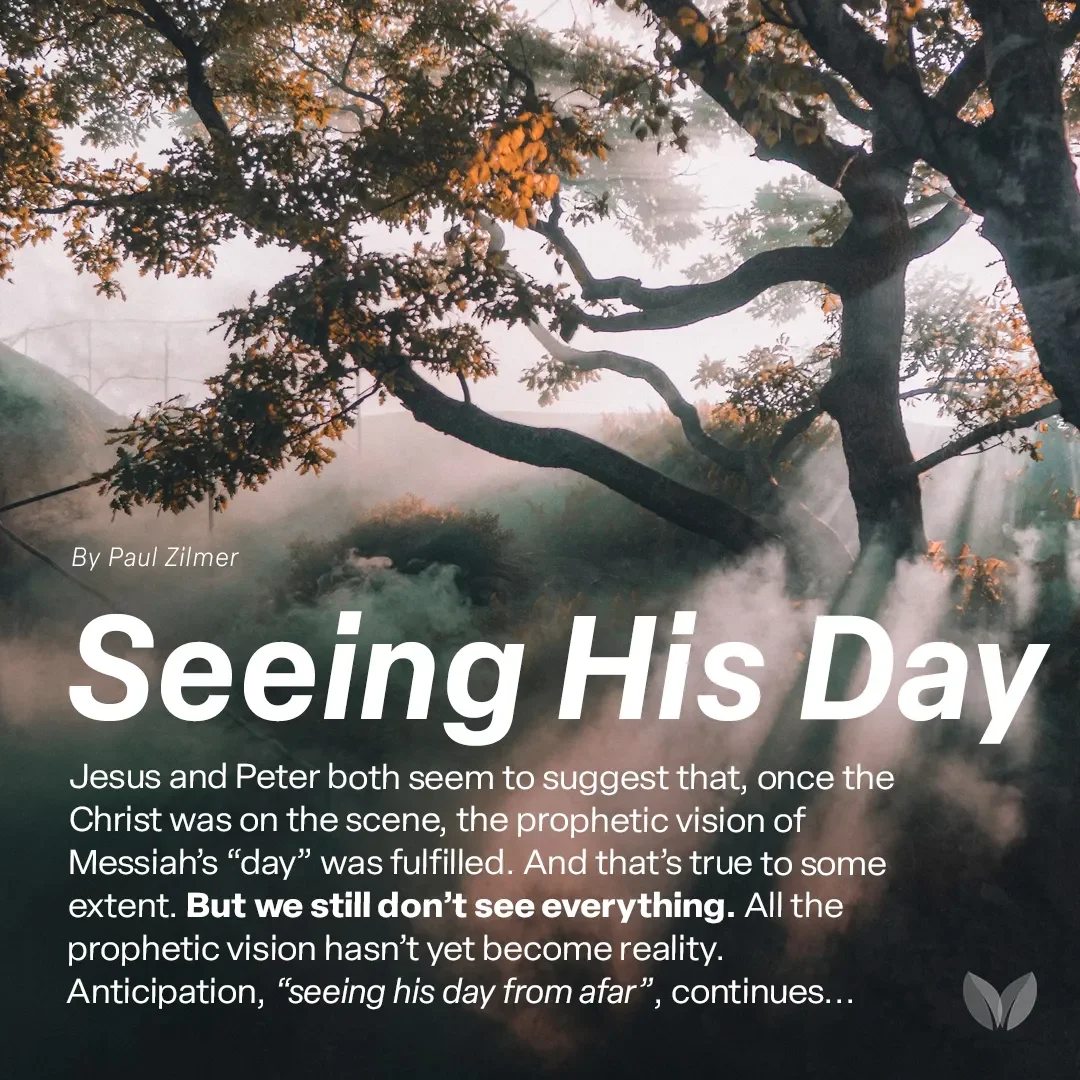Seeing his day
In the final year of his ministry, controversy over Jesus was ramping up, especially in Jerusalem. Rather than try to smooth things out, the Teacher did and said things that actually fed the controversy. John 8 records a series of confrontations with the religious authorities, which left the authorities boiling and the disciples confused. One of the seemingly outrageous things he claimed was:
Your father Abraham rejoiced that he would see my day. He saw it and was glad. (John 8:56)
Abraham had been dead for a couple thousand years. What was Jesus talking about? Well, it’s not too hard to understand that Jesus was talking about prophetic vision, not literal vision with his own eyeballs.
It wasn’t only Abraham who saw Jesus’s day in this way:
These [faithful people of old] all died in faith, not having received the things promised, but having seen them and greeted them from afar, and having acknowledged that they were strangers and exiles on the earth. (Hebrews 11:13)
And Peter writes:
Concerning this salvation, the prophets who prophesied about the grace that was to be yours searched and inquired carefully, inquiring what person or time the Spirit of Christ in them was indicating when he predicted the sufferings of Christ and the subsequent glories. It was revealed to them that they were serving not themselves but you, in the things that have now been announced to you through those who preached the good news to you by the Holy Spirit sent from heaven, things into which angels long to look. (1 Peter 1:10-12)
Two things emerge from Peter’s statement. First is that the “seeing” of Christ’s day wasn’t totally clear or complete. The prophets realized they were looking at a shadow, they could see the outline but couldn’t see the details, even though they really wanted to. Second is the claim that we now have the full picture!
The Hebrews writer presents a long list of the faithful: Abel, Enoch, Abraham, Sarah, Isaac, Jacob, Joseph, Moses and his parents, Rahab, Gideon, Barak, Samson, Jephthah, David, Samuel. Then he adds “the prophets” and he alludes to several other men and women. All of these “saw his day”, long in advance.
Jesus and Peter both seem to suggest that, once the Christ was on the scene, the prophetic vision of Messiah’s “day” was fulfilled. That now we can see the details. And that’s true to some extent—after the crucifixion and resurrection we can see a great deal more. But we still don’t see everything. All the prophetic vision hasn’t yet become reality. Anticipation, “seeing his day from afar”, continues. Backing up one chapter in Hebrews, we are exhorted:
And let us consider how to stir up one another to love and good works, not neglecting to meet together, as is the habit of some, but encouraging one another, and all the more as you see the Day drawing near. (Hebrews 10:24-25)
The writer says the believers of the first century were “seeing the Day” draw near. Something they were still anticipating, even after the revealing of Jesus as the Messiah, after the resurrection, after the ascension. They realized there was still more to come, a “Day” to be anticipated. Those brothers and sisters have been dead a couple thousand years, but that doesn’t mean they didn’t “see his Day”. They did, and it made them glad.
What “Day”? Most translators capitalize the Day in question. Searching out scriptures about “the Day” or “that Day” (in both Old and New Testaments) takes some time but is very rewarding. Spoiler: It’s the Day of the Lord’s return, the establishment of the Kingdom of God that will fill the earth, the enthronement of the Son of David who is also the Son of God, the Day of Judgment. Additional spoiler: It’s not a single 24 hour day, just as the ministry of Jesus wasn’t a single day, and the farsighted perception of Abraham wasn’t a single day.
So we have a question to ponder. Am I “seeing his Day” approaching? Am I paying attention? And in the meantime am I stirring up brothers and sisters in Christ to love and good works, not neglecting to meet together for mutual encouragement?
We don’t know when the Day will arrive. That’s OK. Abraham didn’t know, all those folks in Hebrews 11 didn’t know, the people written to by Peter and the Hebrews writer didn’t know. Even if it turns out to be a long time, that’s OK—as long as we “see his day” clearly, and we are glad.
Love, Paul


